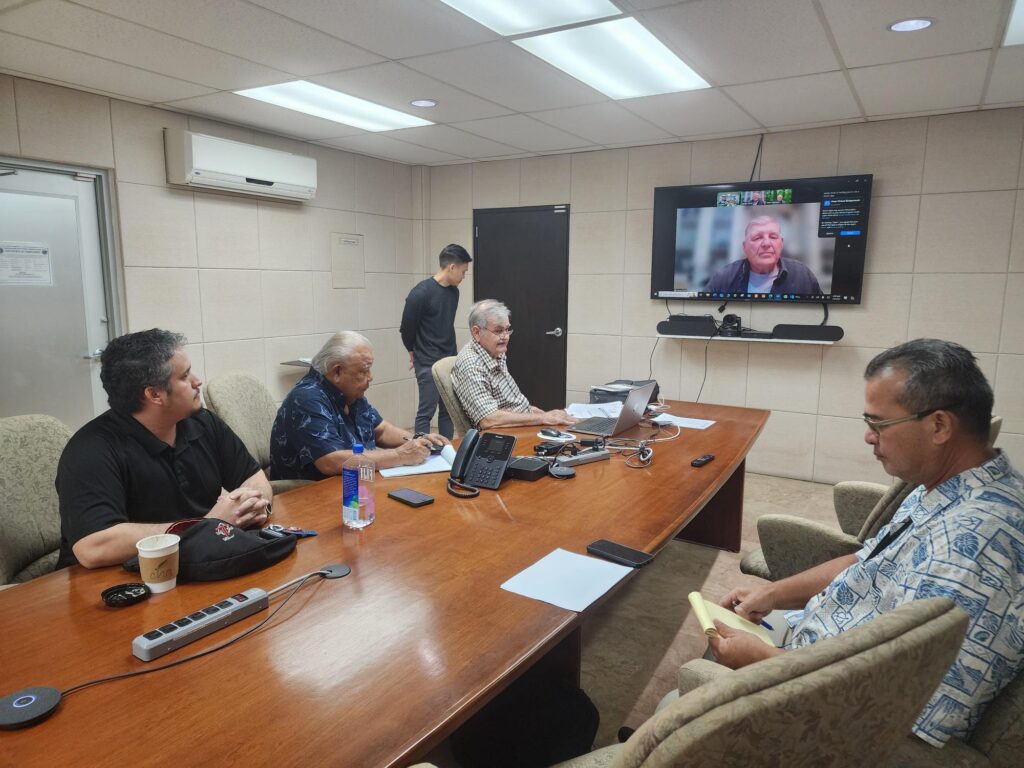
Commonwealth Public Utilities Commission members Jack Angelo, Bruce Camacho, Oscar Quitugua, and James Sirok (via Zoom) meet in the Commonwealth Economic Development Authority conference room on Thursday.
Photo by Bryan Manabat
THE Commonwealth Public Utilities Commission unanimously voted on Thursday to “temporarily freeze” any increases to the Commonwealth Utilities Corporation’s Fuel Adjustment Charge rates.
CPUC members Jack Angelo, Bruce Camacho, Oscar Quitugua, and chair James Sirok, who attended via Zoom, convened in the Commonwealth Economic Development Authority conference room to approve CUC’s petition to stabilize the FAC rate.
“CUC’s executive director, Kevin Watson, and board of directors agreed to stabilize the rate at the January level pending a reconciliation of the FAC and cost of service study,” Angelo said.
On Dec. 10, 2013, CPUC authorized CUC to adjust the LEAC (now known as FAC) rate up or down if the average fuel price per gallon based on the Mean of Platts of Singapore or MOPS exceeds a 4.5% differential from the previous average fuel price.
The Mean of Platts Singapore or MOPS represents the average of a set of Singapore-based oil product price assessments published by Platts, a division of S&P Global.
The FAC is one of two components that make up the CUC electric rate, which is strictly for fuel and fuel-related purchases. The second component is the CUC base rate, which has not increased since April 2014 and is used to fund operations, projects, debt services, or non-fuel related expense.
The FAC rate was set on a monthly basis.
The Financial Times reported on Wednesday that “Oil prices fell for the third day in a row, tumbling nearly 3 percent to the lowest level in three years as fears rise that US President Donald Trump’s trade war will slow economic activity and cut crude demand.”
Latest action
As for CPUC’s decision, Sirok said it effectively freezes any increases to the FAC rate and “stabilizes” it to what it was in January 2025.
CPUC’s latest action will be reflected in ratepayers’ CUC billings starting March 1, 2025.
“We’re not doing anything with the current formula of CUC’s FAC rate — we’re just freezing it right now,” he added.
The January 2025 CUC FAC rate was $0.21119.
CPUC has decided that even if the price of fuel goes up, “the FAC rate would stay as it is,” Sirok said.
Sirok reiterated that the FAC rate “would stay stabilized until we got a reconciliation report from CUC.”
He added, “If the fuel rate went lower, it would stay lower. Even if it was lower below the January rate, it would go down to that rate, but it would never, never go back up. And … we would have this rate stabilized in such a manner until such time as CUC files with us a FAC reconciliation report…so we can understand just how CUC has over collected over the last nine years or under collected over the last nine years.”
The February 2025 CUC FAC rate was slightly higher than January’s, at $0.23498 per kWh.
For the benefit of the public
Asked about CPUC’s action, Watson said: “Yes, we petitioned CPUC to stabilize the FAC rate for the benefit of the public at the January … rate and until such time that we complete the reconciliation.”
He said the reconciliation is being done by their consultant, economist.com.
“This is being undertaken right now and should be completed within 30 to 60 days,” Watson added.
“So it will be the same January FAC rate every month,” he said. “As for reconciliation, my recommendation to CPUC is that we do it every six months so the general public can budget their finances over a six-month period. Once [the] reconciliation is done, then it would stay there for six months, and this is similar, is how they do it in Guam and so then the reconciliation will be done every six months, and then the next six months will be adjusted to cover the under coverage or over coverage,” Watson said.
“We work in collaboration with CPUC for the benefit of the ratepayers,” he added.
Both the CPUC and CUC board members are gubernatorial appointees subject to legislative confirmation.











